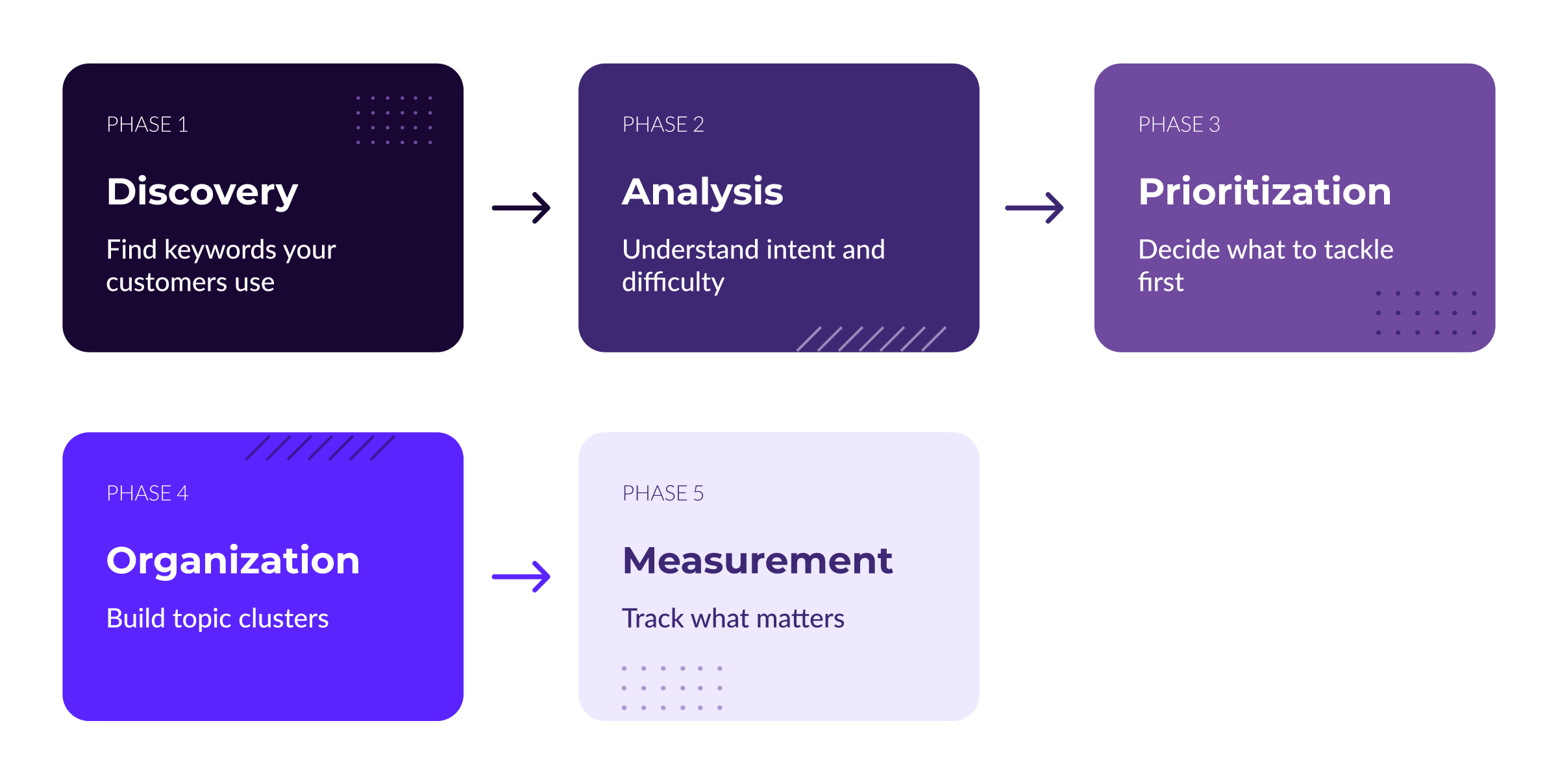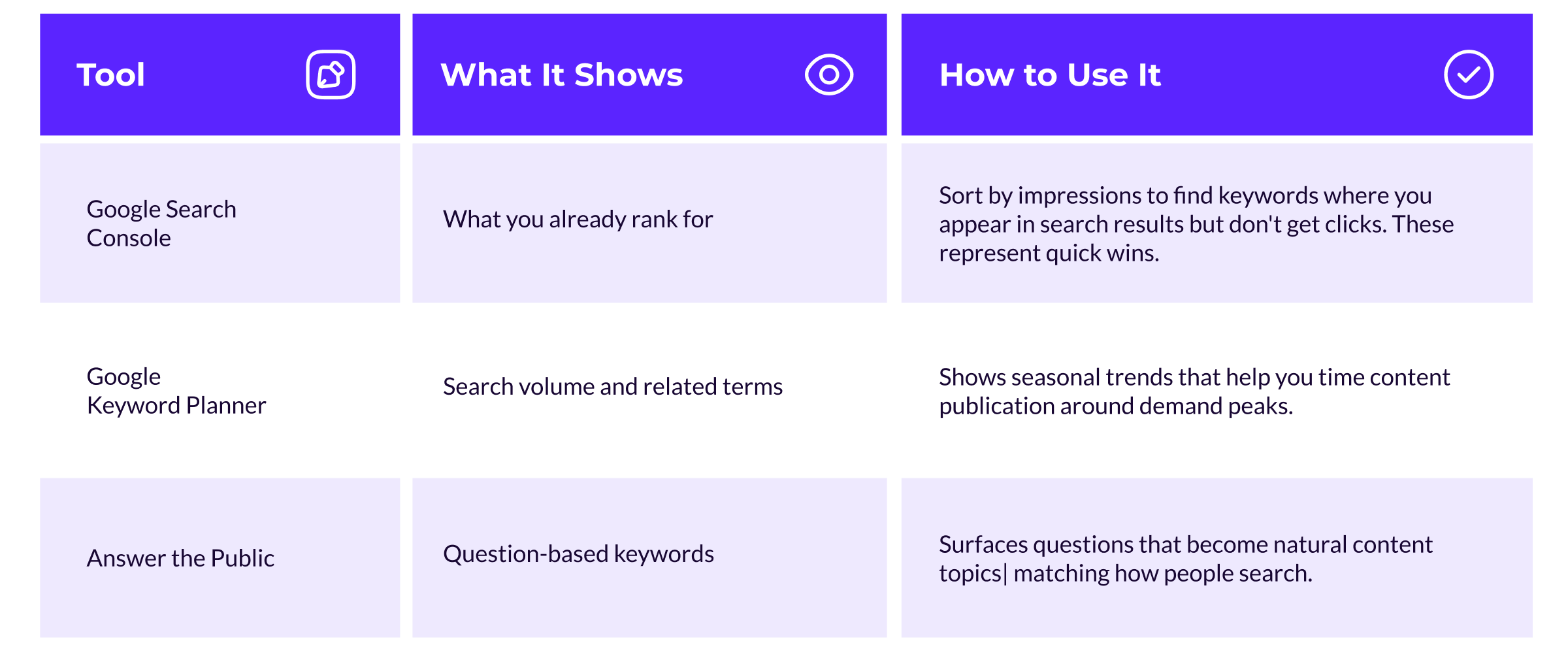How to Build an SEO Keyword Strategy That Drives Results in 2026
There's a disconnect between keyword research and results. Teams invest time finding the right keywords, but struggle to connect that research to their editorial calendar, content creation, and business goals. The gap between knowing which keywords matter and actually using them is where most strategies break down.
Keyword research identifies opportunities. Strategy turns those opportunities into action by mapping keywords to actual content, prioritizing what gets created first, and connecting everything to measurable business goals. Without this connection, even the best research sits unused while websites publish content based on editorial instinct rather than search data.
What Is an SEO Keyword Strategy (And Why Keyword Research Isn't Enough)
The terms "keyword research" and "keyword strategy" get used interchangeably, but they represent fundamentally different activities. Understanding this distinction changes how you approach SEO and explains why research alone never delivers results.
The Difference Between Research and Strategy
Research answers one question: what do people search for? Strategy answers the harder questions.
- Which keywords should you target?
- What content needs to exist?
- When should you publish it
- How will you know if it worked?
The gap between research and strategy shows up in execution. Knowing "nonprofit website design" gets 1,900 searches per month means nothing until someone builds a pillar page around it, creates supporting content, and links everything together.
Why Most Organizations Stop Too Early
Three things kill keyword strategies before they start.
- Teams export keyword lists but never create the content because no one assigns ownership, sets deadlines, or connects keywords to publication dates.
- Writers can't create optimized content without clear direction about which keywords matter most, what intent they're serving, or what questions the content should answer.
- Without success metrics tied to conversions rather than just rankings, no one knows if the effort worked.
Keyword research becomes actionable through content strategy that aligns editorial calendars with search demand and business goals.
How AI Search Changed Keyword Strategy in 2026
AI Overviews, ChatGPT, and Perplexity changed how people find information, which means traditional keyword strategy needs to adapt. But adaptation doesn't mean abandonment, because some keyword types still drive meaningful traffic while others require completely new approaches.
The Zero-Click Reality: What the Numbers Tell Us
More than half of Google searches now end without anyone clicking through to a website. AI Overviews appear for nearly one in five searches, and the impact on organic traffic has been measurable across industries.
You don't need to ring the alarm bells yet, SEO isn't dead.
Search engines still need to pull information from somewhere, and they cite sources that demonstrate expertise and authority. The foundation you build through traditional SEO practices like well-structured content, clear site architecture, and authoritative backlinks directly determines whether AI tools cite your site or your competitors'. Good SEO work becomes the basis for AI visibility rather than wasted effort.
Keywords That Still Drive Traffic (And Which Ones Don't)
Transactional and commercial intent keywords still drive clicks because AI can't complete purchases or make complex buying decisions for people. When someone searches "hire drupal developer" or "best nonprofit website platform," they want options to evaluate.
Complex research queries where AI can't give complete answers also generate traffic. Questions requiring nuanced expertise, recent developments, or multiple perspectives send people to authoritative sources. But simple factual queries that AI answers directly won't drive website traffic anymore. "What is Drupal?" or "How many nonprofit websites exist?" get answered in AI summaries without anyone clicking through.
How to Create an SEO-Friendly Keyword Strategy: The 5-Phase Framework
This practical framework builds on the last: discover, analyze, prioritize, organize, measure. The approach works for marketing teams without dedicated SEO specialists.

Phase 1: Discovery—Finding Keywords That Matter to Your Business
Start with what already works. Google Search Console shows which keywords currently drive traffic to your site, and these existing rankings reveal content opportunities. If a page ranks #8 for a valuable keyword, improving that page might move it to position #3 faster than creating new content from scratch.
Three free tools expand your keyword list effectively:

The key is focusing on keywords your customers use. It’s easy to fall in love with industry jargon that sounds impressive but generates no searches. Real people search for "website builder for nonprofits" not "digital transformation platforms for mission-driven organizations."
Phase 2: Analysis—Understanding Intent and Opportunity
Search intent determines whether a keyword is worth targeting. Four types matter:
- Informational (people want to learn something)
- Navigational (they're searching for a specific site)
- Commercial (they're researching options before deciding)
- Transactional (they're ready to act).
Match your content to intent. Creating transactional content for informational keywords wastes effort because someone searching "what is Drupal" isn't ready for a sales pitch.
Similarly, evaluate whether you can realistically rank before committing resources. Competing with Wikipedia and government sites for broad terms rarely works, so it's better to own specific niches where you can demonstrate genuine expertise.
Search engines evaluate content quality through frameworks like E-E-A-T, which means keywords alone won't drive rankings without demonstrating genuine expertise.
Phase 3: Prioritization—Deciding What to Tackle First
Balance quick wins with strategic targets. Quick wins have lower competition and decent volume, building momentum while you work on harder keywords. But consider business value beyond search volume, because a keyword with 100 monthly searches that targets your ideal customer beats a keyword with 10,000 searches that isn’t your ICP.
Create a realistic timeline based on what you can produce. Most organizations overestimate content production capacity. Better to target 10 keywords well than 100 keywords poorly.
Phase 4: Organization—Building Topic Clusters That Build Authority
Topic clusters organize content around central pillar pages that comprehensively cover broad topics, with related cluster pages diving deep into specific subtopics. If you're targeting "website redesign," you probably also want "website redesign checklist," "website redesign cost," and "website redesign timeline" as cluster content supporting a main pillar page.
Map keywords to existing pages or identify content gaps. Sometimes you already have content that needs optimization rather than new pages. Document which scenario applies to each keyword, then build an internal linking strategy connecting cluster content to pillar pages and related cluster pages to each other. This helps search engines understand your content hierarchy and how topics relate.
For Drupal users, tools like the Real-time SEO module provide instant feedback while you write, catching keyword optimization opportunities before you publish.
Phase 5: Measurement—Tracking What Matters
Track rankings, but focus on organic traffic and conversions. Monitor which keywords drive business results like leads, signups, or sales, then adjust strategy based on what works. If blog posts about nonprofit website design generate qualified leads while posts about general web design attract non-converting traffic, create more nonprofit-focused content. Let data drive decisions.
Keyword Strategy for Different Organizations
What works for B2B won't work for higher education or nonprofits. These sector-specific approaches come from working with clients across multiple industries who face unique keyword challenges.
Higher Education: Balancing Student and Parent Search Behavior
Students search differently than parents. Students might search for "computer science programs California" while parents search for "best ROI computer science degrees." Both audiences matter, but they need different content addressing different concerns.
Local versus national competition also varies by program type. Community colleges compete locally while elite universities compete nationally, which changes which keywords are realistic targets. And seasonal peaks around application deadlines require careful content timing since publishing scholarship information in June misses the August application rush.
Enterprise B2B: Mapping Keywords to Long Sales Cycles
Keywords align with buyer journey stages in B2B. Awareness stage searches look like "what is enterprise content management" while consideration searches become "enterprise CMS comparison." Decision stage searches turn into "Drupal implementation partners."
Low search volume doesn't mean low value in B2B markets. Niche terms might get 50 searches monthly, but if those 50 people represent your entire addressable market, every click matters. Focus on commercial intent and problem-solving content since B2B buyers research solutions to specific problems.
Nonprofits and Government: Mission-Driven Keyword Approaches
Keywords should reflect services people need rather than organizational structure. People search for "how to apply for housing assistance" not "department of housing and urban development programs."
Accessibility and plain language requirements affect keyword choices in this sector. Government sites must use clear, straightforward language, which helps SEO since people search in plain language too. Balance mission visibility with practical service delivery by targeting keywords that attract both donors and beneficiaries finding services.
Common Mistakes That Undermine Keyword Strategies
Even smart marketers make these mistakes. Each has a specific fix worth learning before you waste time and budget.
Keyword Cannibalization: When Your Pages Compete Against Each Other
Multiple pages targeting the same keyword confuse search engines about which page should rank, so both pages perform worse than one strong page would. The fix is either consolidating competing content into single, authoritative pages or differentiating content with clear keyword focus per page.
Fixing cannibalization delivers measurable results. When you consolidate competing pages into one authoritative resource, traffic can increase dramatically. If you need separate pages, make sure each targets distinct keywords. A page about "Drupal development" and a page about "Drupal development services" are too similar and will compete. Better to have "Drupal development" and "Drupal migration services" as separate targets.
Chasing Volume Over Intent
High-volume keywords often have wrong intent or too much competition. Everyone wants to rank for broad terms, which makes them nearly impossible to win. A keyword with 200 monthly searches that converts at 10% beats a keyword with 20,000 searches that converts at 0.1%.
Think about the difference between "marketing" with 500,000 monthly searches versus "Drupal marketing agency" with 200 searches. The first is extremely difficult to rank for and attracts people looking for everything from entry-level jobs to academic definitions. The second brings people actively looking for exactly what a specialized agency provides.
Ignoring What Your Competitors Already Figured Out
Competitor keyword analysis reveals what's already working in your industry without requiring expensive testing. Learn from their successes and gaps rather than copying their strategy directly. If competitors rank well for certain keywords, those keywords obviously drive value. If they're missing keywords you'd expect to see, that gap represents an opportunity worth exploring.
Building Your Keyword Strategy Toolkit
You don't need expensive tools to start. The question is knowing when free tools are enough versus when to invest in paid options based on your organization size and goals.
The free tools covered in Phase 1 (Google Search Console, Google Keyword Planner, Answer the Public) handle basic keyword research effectively. They show you what you rank for, provide search volume estimates, and surface question-based keywords. For many organizations, these tools are enough to build an effective keyword strategy.
Invest in paid tools when you need competitive intelligence beyond your own data. Paid tools like Ahrefs and Semrush provide keyword databases with billions of terms, competitive analysis features, and difficulty scoring that helps you prioritize where to focus your efforts.
They're worth the cost when you're doing keyword research at scale for hundreds of keywords, since they automate analysis that would take days manually. And when you need difficulty scoring to prioritize efforts, paid tools calculate how hard it will be to rank based on current competition.
When your keyword strategy requires ongoing optimization and expert guidance, professional SEO services can help you execute on the research and maintain momentum.
Ready to Transform Your Keyword Strategy?
A keyword research strategy requires ongoing effort rather than one-time research. Keywords change as search behavior shifts, competition evolves, and new topics emerge. Regular review and adjustment separate successful strategies from abandoned spreadsheets gathering digital dust.
Start with this framework and adjust based on your results. The five phases provide structure, but every organization needs to adapt them to specific circumstances. What works for enterprise B2B might not work for nonprofits, and what worked last year might not work next quarter.
If building a sustainable keyword strategy feels overwhelming, let's talk about how ImageX can help you prioritize efforts and measure what matters.







